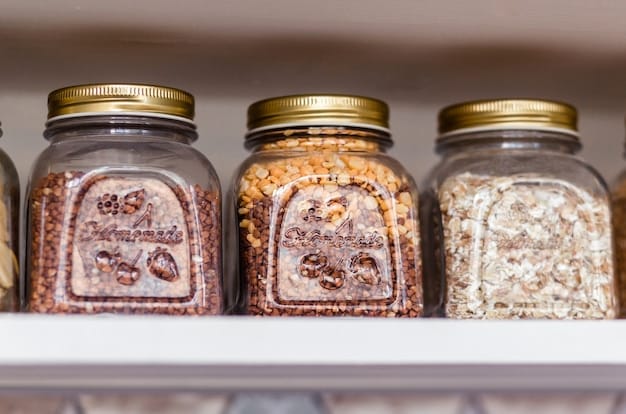Mindful Meal Prep: Save Time & Improve Your Food Relationship in 2025

Mindful meal prep is a transformative approach to planning and preparing meals, integrating mindfulness principles to enhance the overall eating experience, save time, and cultivate a healthier relationship with food in 2025.
Imagine reclaiming two hours each week while simultaneously improving your relationship with food. This is the promise of mindful meal prep, a practice that extends far beyond simply preparing meals in advance. It’s about infusing awareness and intention into every step, transforming a chore into a mindful activity for a healthier you in 2025.
What is Mindful Meal Prep?
Mindful meal prep goes beyond the usual batch cooking of chicken and rice. It’s about engaging your senses, appreciating the ingredients, and creating meals with intention and awareness. It’s a way to transform your relationship with food and make healthier choices more accessible.
The Core Principles
At its heart, mindful meal prep is about slowing down and paying attention. Instead of rushing through the process, you take time to appreciate the colors, textures, and aromas of the food you are preparing. This approach can reduce stress and make the entire experience more enjoyable.
Connecting with Your Food
Mindfulness encourages you to be present in the moment. When applied to meal prep, this means being aware of your body’s needs and cravings. This connection can guide you towards making choices that truly nourish you, both physically and emotionally.
- Enhanced Awareness: Increased sensitivity to flavors and textures.
- Reduced Stress: A calm and deliberate approach to cooking.
- Healthier Choices: Improved ability to choose nourishing foods.
- Improved Relationship with Food: Feeling gratitude for your meals.
In essence, mindful meal prep is about bringing your full attention to the task at hand, fostering a deeper connection with your food and your body. This awareness can lead to more satisfying and healthful eating habits, making your meal prep sessions truly beneficial for your overall well-being.
Strategy 1: Planning with Presence
Effective meal prep starts long before you step into the kitchen. It begins with a mindful planning session where you consider your needs, preferences, and goals. This proactive approach sets the stage for success.

Assess Your Week
Before diving into recipes, take a moment to assess your upcoming week. Consider your schedule, commitments, and any potential challenges that may impact your eating habits. This awareness will help you make informed decisions about what to prepare.
Consider Nutritional Needs
Think about your nutritional goals and any dietary restrictions or preferences you may have. Are you trying to increase your protein intake, reduce sugar consumption, or incorporate more vegetables into your diet? Keeping these factors in mind will guide your meal choices.
Mindful planning involves more than just jotting down recipes. It’s about creating a roadmap that supports your health and well-being. By considering these factors during your planning session, you can ensure that your meal prep efforts align with your overall goals allowing you to have a better relationship with food.
Strategy 2: Shopping with Intention
The grocery store can be a minefield of tempting but unhealthy options. Shopping with intention means making mindful choices that support your meal prep goals. This involves being selective and avoiding impulsive purchases.
Create a Detailed List
Before heading to the store, create a detailed shopping list based on your meal plan. This will help you stay focused and avoid impulse buys. Stick to the list and resist the temptation to add unnecessary items to your cart.
Read Labels Carefully
Take the time to read labels and become aware of the ingredients in the foods you are buying. Pay attention to serving sizes, nutritional information, and any added sugars, salts, or unhealthy fats. Choose whole, unprocessed foods whenever possible.
Shopping with intention is about being conscious of your choices and making decisions that align with your health goals. By creating a detailed list, reading labels carefully, and focusing on whole, unprocessed foods, you can navigate the grocery store with ease and make informed choices that support your meal prep efforts.
Strategy 3: Creating a Mindful Space
Your kitchen environment can have a significant impact on your meal prep experience. Creating a mindful space involves decluttering, organizing, and setting the stage for a calm and focused cooking session.
Declutter and Organize
Before you begin meal prepping, take a few minutes to declutter your kitchen. Clear off countertops, put away unnecessary items, and organize your pantry and refrigerator. A clean and organized space can promote a sense of calm and focus.

Engage Your Senses
Activate your senses by playing soothing music, lighting a candle, or opening a window to let in fresh air. These sensory experiences can enhance your meal prep session and make it more enjoyable.
- Improved Focus: A clean and organized space minimizes distractions.
- Reduced Stress: A calm environment promotes relaxation.
- Enhanced Creativity: Engaging your senses can spark inspiration.
- Increased Enjoyment: Pleasant surroundings make cooking more enjoyable.
Creating a mindful space is about setting the stage for a positive and productive meal prep session. By decluttering, organizing, and engaging your senses, you can transform your kitchen into a sanctuary of calm and creativity. This approach can make meal prepping a more enjoyable and rewarding experience.
Strategy 4: Mindful Cooking Techniques
Mindful cooking is about engaging your senses and focusing on the present moment while preparing your meals. This involves slowing down, paying attention to the details, and appreciating the process.
Engage Your Senses
As you chop vegetables, stir sauces, and season dishes, take a moment to engage your senses. Notice the colors, textures, and aromas of the ingredients. Appreciate the sounds of the sizzling pan and the bubbling pot. This sensory awareness can enhance your cooking experience and make it more enjoyable.
Practice Gratitude
As you prepare your meals, take a moment to practice gratitude for the food you are working with. Consider the journey it took to get to your plate, from the farmers who grew it to the grocers who stocked it. This sense of gratitude can deepen your connection with your food and make you more mindful of your choices.
Mindful cooking techniques are about transforming a mundane task into a mindful and enjoyable experience. By engaging your senses, practicing gratitude, and focusing on the present moment, you can cultivate a deeper connection with your food and enhance your overall well-being. Slowing things down can also make you feel like you have more overall time during the week.
Strategy 5: Savoring the Experience
Mindfulness doesn’t end when the cooking is done. It extends to the eating experience as well. Savoring your meals involves taking the time to fully appreciate the flavors, textures, and aromas of your food.
Eat Slowly and Deliberately
Avoid rushing through your meals or eating on the go. Instead, find a quiet place to sit down and focus on your food. Take small bites, chew thoroughly, and savor each mouthful. Notice the flavors and textures as they unfold in your mouth.
Eliminate Distractions
Turn off the TV, put away your phone, and eliminate any other distractions that may interfere with your eating experience. Focus solely on your food and the sensations it evokes. This helps you become more attuned to your body’s hunger and fullness cues.
Savoring the experience is about transforming mealtime into a mindful and enjoyable ritual. By eating slowly and deliberately, eliminating distractions, and paying attention to your body’s cues, you can cultivate a deeper appreciation for your food and enhance your overall well-being, all while improving your relationship with food.
| Key Point | Brief Description |
|---|---|
| 🗓️ Planning with Presence | Assess your week and consider your nutritional needs before shopping. |
| 🛒 Shopping with Intention | Create a detailed list and read labels carefully to avoid unhealthy purchases. |
| 🧘 Mindful Cooking | Engage your senses and practice gratitude while preparing your meals. |
| 🍽️ Savoring the Experience | Eat slowly, eliminate distractions, and pay attention to your body’s cues. |
Frequently Asked Questions
▼
The primary benefit is cultivating a healthier relationship with food by increasing awareness and intention in your eating habits, which can reduce stress and improve overall well-being.
▼
By mindfully planning your meals and shopping with a list, you reduce impulse buys and decision fatigue, streamlining the cooking process and saving time throughout the week.
▼
Shopping with intention means creating a detailed list based on your meal plan, reading labels carefully, and choosing whole, unprocessed foods whenever possible to avoid unnecessary impulse buys.
▼
Declutter your kitchen, organize your pantry, and engage your senses with soothing music or a pleasant aroma to promote calm and focus during your meal prep sessions.
▼
Engage your senses by noticing the colors, textures, and aromas of the ingredients, and practice gratitude for the food you are working with to deepen your connection with your meals.
Conclusion
By implementing these five strategies, you can transform your meal prep routine into a mindful and enjoyable experience, ultimately saving time, improving your relationship with food, and enhancing your overall well-being. So, take a deep breath, embrace the present moment, and embark on your mindful meal prep journey today.





